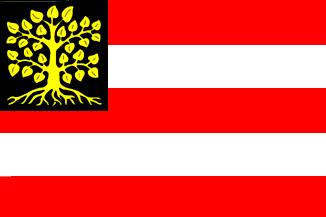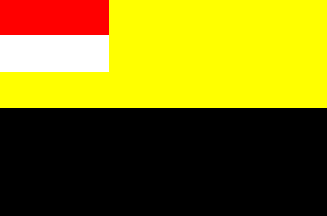 Shipmate Flagchart : http://www.shipmate.nl/flags.htm
Shipmate Flagchart : http://www.shipmate.nl/flags.htm
adopted 23 Sep 1999

Last modified: 2005-05-13 by jarig bakker
Keywords: den bosch | hertogenbosch |
Links: FOTW homepage |
search |
disclaimer and copyright |
write us |
mirrors
 Shipmate Flagchart : http://www.shipmate.nl/flags.htm
Shipmate Flagchart : http://www.shipmate.nl/flags.htm
adopted 23 Sep 1999
Note that the official name is 's-Hertogenbosch. Den Bosch is the popular
name. The name in French is Bois-le-Duc.
Mark Sensen, 20 Jul 2003
Why the hell do you use such a complicated name whereas the French equivalent
Bois-le-Duc
would be so simple and elegant? Tour de France 1994 started in Den Bosch.
Several French reporters definitively puzzled by the weird 's called
the city "Saint.
Hertogenbosch", which might therefore be elected patron saint
of the illiterate reporters :-).
The coloured ribbon used to tie giftwrapped parcels is called in French
"bolduc", from Bois-le-Duc, where this product was manufactured
in the past.
The Guide Vert Michelin Hollande says that Den Bosch was granted city
rights by Hendrik I of Brabant in 1185. In 1561, Philip II of Spain, then
ruling the Low Countries, made of Den Bosch a bishopric depending on the
archbishopric of Mechelen. In 1579, the city took the Spanish party and
surrendered to Frederik-Hendrik, Prince of Orange, only in 1629, after
a long siege. In 1794, the city was seized by the French general Pichegru
after a 18-day siege, and became, as Bois-le-Duc, the capital city of the
department of Bouches-du-Rhin.
Den Bosch is the birth city of Hieronymus van Aken (c. 1450-1516),
better known as the painter Hieronymus (Jeroen) Bosch.
Ivan Sache, 20 Jul 2003
![['s-Hertogenbosch 1957 flag]](../images/n/nl-nb_d4.gif) by Jarig Bakker, 20 Jul 2003
by Jarig Bakker, 20 Jul 2003
Sierksma's Nederlands Vlaggenboek, 1962 [sie62]
writes:
Flagdescription: Seven equally wide horizontal stripes of red and white,
with in the canton a black square, with a height of four horizontal stripes,
on which a yellow leaved tree.
This flag was in use since 1957 after a design by laborers of the municipality.
The yellow tree on black is the factual municipal symbol, as used since
the first half of the 13th century. The red and white stripes, also found
in the municipal arms, remind of the Habsburgers, who gained a stable position
in the Netherlands by the presence of Maximilian in 1482.
On 4 Apr 1857 the "commissaris des konings" (provincial governor)
of Noord-Brabant wrote to the minister of Home Affairs, that the "municipal
flag of 's-Hertogenbosch was a flag of two equally wide horizontal stripes
in red and white, with in the center the complete municipal arms.
Jarig Bakker, 20 Jul 2003
![[Den Bosch CoA]](../images/n/nl-nb)db.jpg) from
the 's-Hertogenbosch municipal
website.
from
the 's-Hertogenbosch municipal
website.
Granted 25 Jun 1999.
Note that from 1817 till 1978 there was an error in the municipal arms:
The quarters with the Limburg arms showed the red lion on a field of
gold (instead of silver), the lion uncrowned (instead of crowned) and singletailed
(instead od doubletailed).
See Ralf Hartemink's page about 's-Hertogenbosch.
Mark Sensen, 20 Jul 2003
 Shipmate Flagchart : http://www.shipmate.nl/flags.htm
Shipmate Flagchart : http://www.shipmate.nl/flags.htm
Flagdescription: two equally wide horizontal stripes of yellow and black,
with in the canton two equally wide horizontal stripes of red and white.
Adopted by municipal resolution on 26 Oct 1989.
![['s-Hertogenbosch 1935 flag]](../images/n/nl-nb_35.gif) by Jarig Bakker, 20 Jul 2003
by Jarig Bakker, 20 Jul 2003
Derkwillem Visser's Gemeentevlaggen en wapens Koninkrijk der Nederlanden,
2001, has another one:
Description occasional banner of 1935 (750 years of existence of Den
Bosch): chequy with red and white blocks and a square with the municipal
arms of 's-Hertogenbosch.
For the flight of steps of the city council-house these two banners
of arms were made (Brabant and Den Bosch). These were still in use in 1947
and 1955.
Jarig Bakker, 20 Jul 2003
At the homage of all North-Brabant mayors to the celebrating city in
July 1935, there was such a flag with the respective municipal arms in
the canton for each municipality. Afterwards they were given to each mayer
to take with them. In several municipalities they were later used as (unofficial)
municipal flag.
In one case (the former municipality of Den
Dungen, the flag was later adopted officially (in 2:3 form).
Source: [ham86], p. 126-128.
Mark Sensen, 20 Jul 2003
![['s-Hertogenbosch 1957 flag]](../images/n/nl-nb_d4.gif) by Jarig Bakker, 20 Jul 2003
by Jarig Bakker, 20 Jul 2003
Sierksma's Nederlands Vlaggenboek, 1962 [sie62]
writes:
Flagdescription: Seven equally wide horizontal stripes of red and white,
with in the canton a black square, with a height of four horizontal stripes,
on which a yellow leaved tree.
This flag was in use since 1957 after a design by laborers of the municipality.
The yellow tree on black is the factual municipal symbol, as used since
the first half of the 13th century. The red and white struipes, also found
in the municipal arms, remind of the Habsburgers, who gained a stable position
in the Netherlands by the presence of Maximilian in 1482.
On 4 Apr 1857 the "commissaris des konings" (provincial governor)
of Noord-Brabant wrote to the minister of Home Affairs, that the "municipal
flag of 's-Hertogenbosch was a flag of two equally wide horizontal stripes
in red and white, with in the center the complete municipal arms.
<I tried that one, but the result was too horrible to behold :-(
>
Jarig Bakker, 20 Jul 2003